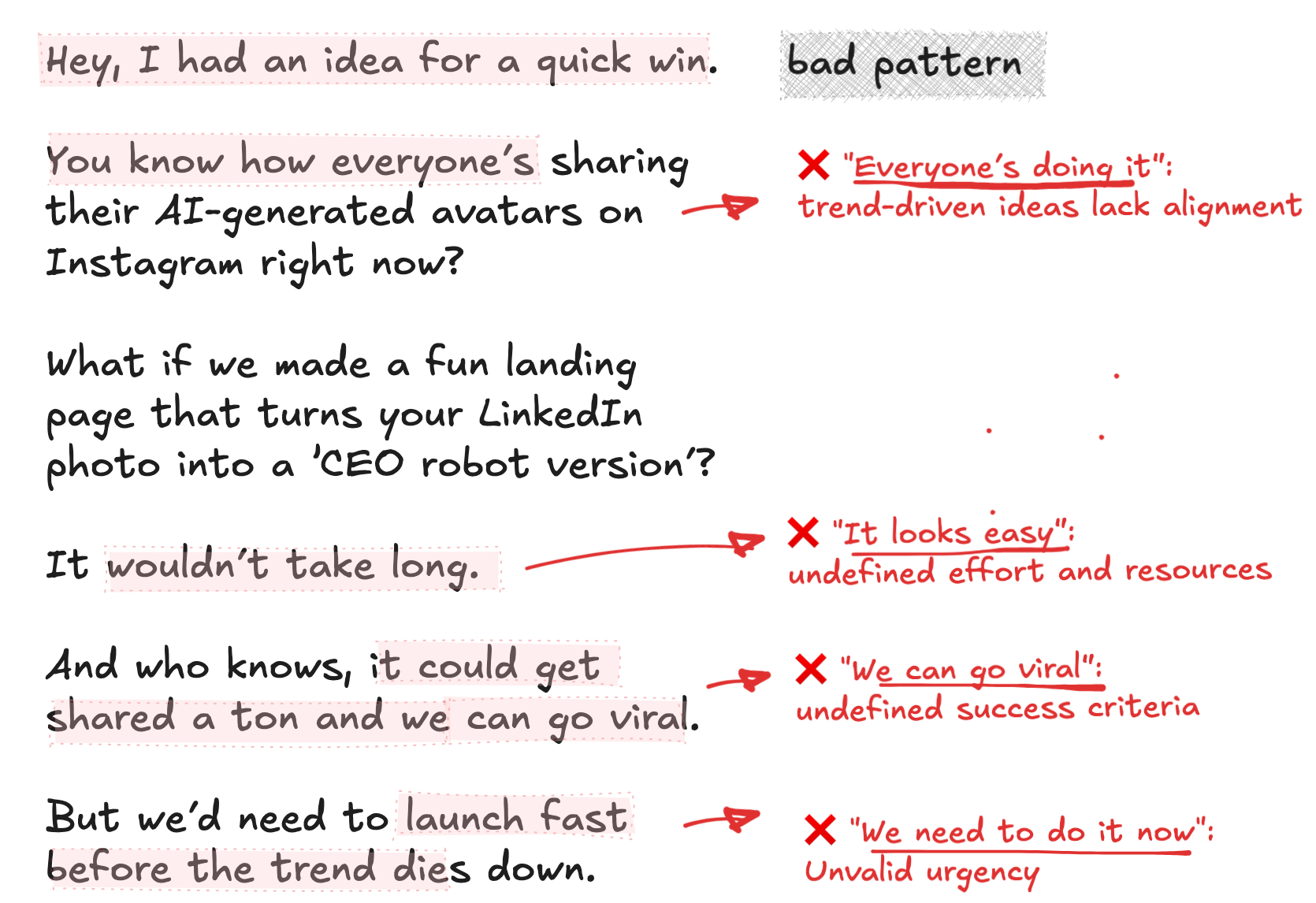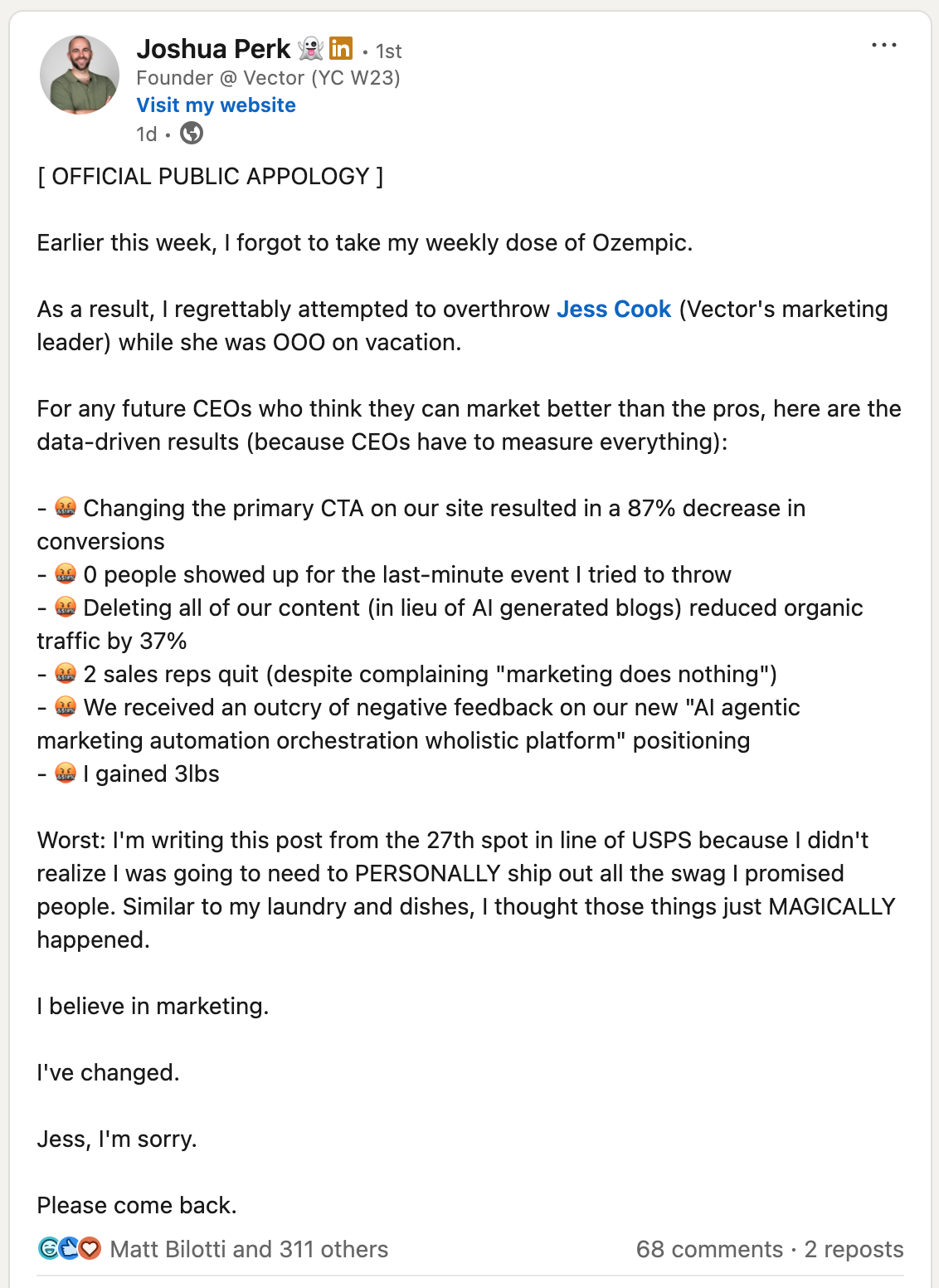It starts with good intentions:
I have an ideia for a quick win.
To be fair, some actually work That’s what makes quick wins dangerous

Quick wins eventually succeed. And when they do, it feels like real progress. Founders and the teams get that sugar high, a sense of momentum. But under the surface, something important isn’t happening: growth.

Real growth looks different. It doesn’t spike. It compounds. But you don't get there from quick-win to quick-win.
The best marketing strategies often blend both short and long-term thinking. But most early-stage companies get stuck, orbiting towards short-term mindset for longer than they should, until the hidden cost of jumping from one quick win to another becomes impossible to ignore.
I've never met a founder who didn't get how flawed this prioritization is. Not one. They know that building a proprietary content engine pays off, founder-led content builds trust, and consistent publishing compounds. And they know all of these are long-term plays with serious ROI. They all know.
But when you've got 8 months of runway and every Monday starts with "how do we hit this month's number," investing in something that pays off in 3-5 months feels like rearranging deck chairs on the Titanic.
So early-stage founders default to quick wins.
| Aspect | Quick Wins | Sustainable Growth |
|---|---|---|
| Speed | Expectation for quick results | Consistent, gradual progress |
| Duration | Short-term impact | Long-lasting, compounding value |
| Effort | Tactical, reactive | Strategic, intentional |
| Users | Attracts opportunistic users | Attracts loyal, high-LTV customers |
| Brand | Temporary visibility | Long-term brand equity |
| Risk | High volatility, easily lost | Stable, resilient over time |
The problem isn’t the quick wins themselves. It’s what they replace, when you're constantly optimizing for immediate results. It trades long-term impact for temporary visibility and scattered focus."
The anatomy of bad quick win
Not all quick wins are bad. But the worst ones follow a familiar pattern:
- “Everyone’s doing it”: Others are doing it, so it might work for us too;
- “It looks easy”: So we can try without effort or resources;
- "We can go viral”: There’s a mystical hope for virality;
- “We need to do it now" : If we wait, we’ll miss the timing.
Often it also suggested by the CEO or carrying his implicit approval. Put all that together, and it feels too attractive to question. So no one stops to think it through.

I’ve been there myself. I used to be that CEO overshooting poorly briefed, loosely communicated quick win ideas to marketing leaders. When you do this. Soon the whole team joins in - everyone “just wants to help.” Then, the marketing leader is overwhelmed by scattered ideas coming from all sides. Eventually they break. They stop pushing back, and start saying yes to everything, and slip into survival mode. The whole team can smell the desperation. It’s only a matter of time before they quit or get fired, for a problem that started at the top.
This happens more often than you think:

The more a team gets addicted to quick wins, the more it delays consistent growth
How good quick wins look like
Sometimes a quick win is the right call. But the key is structure and alignment. Quick wins need to pass through a sanity check.

Template for good quick win
Here’s a template to frame marketing quick wins you can use:
Hey, I have an idea for a quick win.
Your know our goal of
_____________________________
(insert the goal the quick win is boosting)
What if we we:
____________________________
(your quick win idea)
Here’s what it would take:
____________________________
(estimation what we'll need to make it happen)
I'm assuming that this will happen:
_____________________________
(underlying hypothesis for your quick win)
If I'm right, this will result in:
______________________________
(concrete contribuiton to overall marketing goal)
But we'll need to ship this by
______________________________
(time frame for your quick-win)
Because
______________________________
(the "why now" of your quick-win)
This template above:
- Shields marketing leaders from poorly briefed, distracting ideas.
- Empowers the entire team to contribute at a high level.
- Fosters alignment with overall business goals and strategy.
Quick wins make sense when they contribute clearly to a strategy in motion. If there’s no strategy? No core system being executed? Then “quick wins” are just noise. Camouflage for a deeper problem: you don't have a plan.
How to pushback on quick wins
10x marketers are rarer than 10x engineers. Both, they share traits:
- They’re system thinkers: they ideate and build engines.
- They say "no": not “maybe” or “later”, but plain “NO”.
In real life, "plain NO" doesn't land the same in every environment. Mature teams with a solid strategy in place are more likely to welcome it. They understand that growth requires focus and focus requires boundaries. But let's be honest: that´s not most early-stage companies. When strategy is vague and alignment is weak, saying plain “no” can sound as you're avoiding extra-work. Many marketing leaders need to pushback quick win ideas with diplomacy.
Here’s how to reject a quick win without sounding like a bottleneck:
- This could work but only if it ties to our [insert strategy]. Let me show you how it is structured so we can see if it makes sense.
- If we go after this now, we’ll need to pause [insert initiative] . Are we okay with that trade-off?
- We can explore this once we’ve delivered [insert initiative]. That’s where we need momentum first.
- Interesting idea. Just so I understand: how is it going to move [insert core metric] ?
- Say we jump in [insert suggested idea], what do you think we'll need to execute this?
- Why do you think we need to do this until [insert suggested deadline]?
Closing thoughts
Quick wins aren’t the enemy. But mistaking them for strategy is. If you're flooding your team with disconnected ideas too often, they will default to quick win mode and underdeliver in the long-term. Consistent growth feels boring before it feels effective. It’s structured, focused, and compounds. You don't need to eliminate quick wins but to anchor them in a clear strategy.
Roots before fruits







